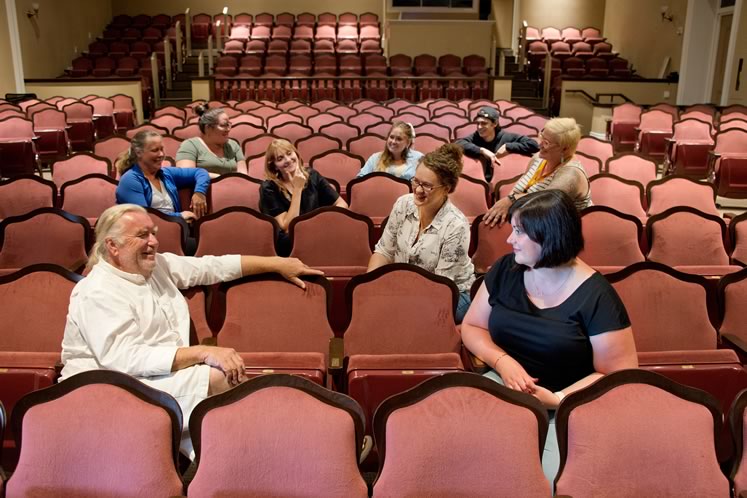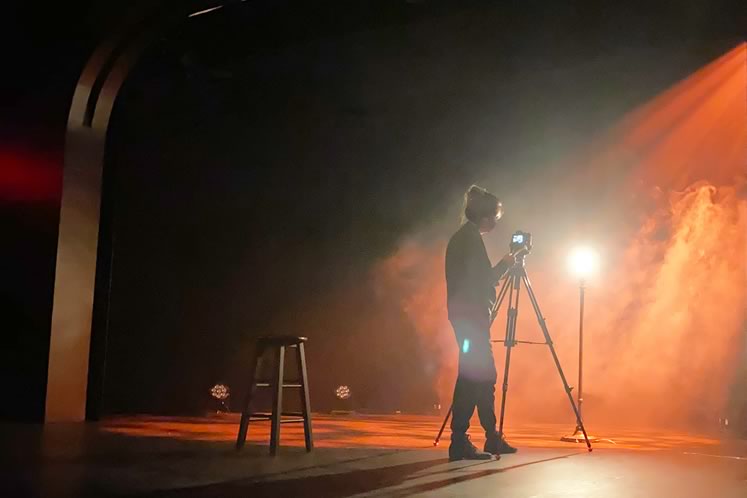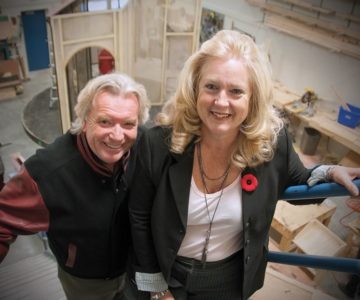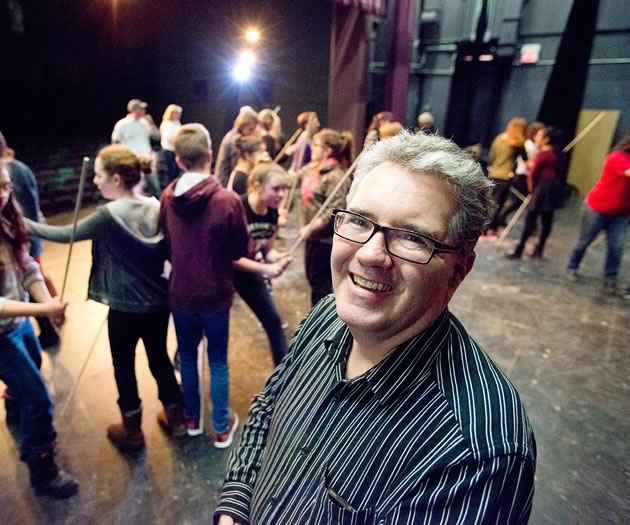How to Save a Theatre
The creative minds at Theatre Orangeville were not about to be upstaged by a pandemic.
Opening night. March 13, 2020. Friday the 13th. Usually David Nairn’s lucky day, a quirk of his celebrated and prolific 22-year career as artistic director of Theatre Orangeville.
With Nairn at the helm since 1999, Theatre Orangeville has become the blueprint for professional regional theatre in Ontario. From Dan Needles’ homespun Wingfield series to the 2021 world premiere of John Spurway’s The Third Life of Eddie Mann, the Opera House stage in Orangeville town hall – serendipitously located “on Broadway,” the town’s main street – has hosted many an opening night for Canadian playwrights. It has also launched more than a few theatre careers.

In the seats they hope will soon host theatre-lovers again, some of the staff who kept things going: (front row) David Nairn, artistic director; Sharyn Ayliffe, general manager; (rear rows, left to right) Diane Bator, box office manager; Lisa Lahue, technical director; Sara May, videographer; Kait Gallant, programs co-ordinator; Paula Stewart, office manager; Dan Palmieri, assistant technical director; Beckie Morris, production manager. Photo by Pete Paterson.
That Friday shouldn’t have been any different – or so Nairn and his team had hoped. The journey that began that night, however, would brim with unthinkable disappointment and uncertainty, but also with opportunity. It would open the door to a new chapter in Theatre Orangeville history, one that no one could have imagined.
“We were selling out and just coming off the high of Little Women over Christmas. Our subscription numbers were up,” recalls Nairn. “We had brought in a show based on the music of Gordon Lightfoot. That sold out. Then, that Friday night, we were looking forward to the world premiere of a new play, Too Close to Home by Alison Lawrence, a delightful comedy. It’s always a joy, an honour, a thrill to bring a new work here – to know that playwrights trust us with their plays.”
As if conjuring up that night, Nairn casts a long look around the empty 273-seat house where we’re chatting. The memory is bittersweet. That Friday the 13th performance was the last time stage lights would go up in the space before the pandemic lockdown. “I remember joking to the cast and crew, ‘Who can say they opened and closed on Broadway on the same night?’” says Nairn.

The cast and crew of Too Close to Home. The play opened and closed on one fateful night in March 2020, and the set then languished on stage for months afterward. The play will be restaged at a future date. Photo by Pete Paterson.
Sharyn Ayliffe had just taken over as general manager. A veteran of the theatre’s management team, she was still finding her feet in her new role. The day of that opening night began like any other. “We started that morning with 273 seats sold, a full house. By 10 a.m., there were some cancellations, but we were sitting at 220. By 1 o’clock, it was down to 175.” Like Nairn, Ayliffe recounts the day as if it’s livestreaming in her head. “By just before curtain, I recall walking in here, and I want to say there were maybe 120 people in the house. It was clear, in just that time and space, the world had changed.”
The next day Orangeville mayor Sandy Brown called Nairn into his office. It was a sombre meeting. All town facilities, including the theatre, were being closed down. Nairn and Ayliffe informed the actors and crew. People came in to clear out dressing rooms.
“Like everyone in the world, all of us were in shock, disbelief, denial – all of those stages of grieving,” reflects Ayliffe.
It would be more than five months before they would return. “When we finally came back, the opening night set was sitting there just as we had left it,” recalls Nairn. “It was very strange. Almost macabre.” Even this past summer, headshots of the cast of Too Close to Home remained on the wall in the lobby.
The closing in 2020 was not the first time the stage of the Orangeville Opera House had gone dark. In the late 1960s the space was converted to offices. It wasn’t until the 1990s that the town hall, including the Opera House, was renovated in a style celebrating its 19th-century glory – and its original purpose as a meeting place for community, commerce and the arts.
Built for $10,000 and completed in 1876, the town hall included space for a public market, as well as the council chambers. On the second floor, an assembly hall with a small stage could be rented for meetings, concerts, balls and receptions. The renovation, completed in 1994, created the Opera House, a theatre space that was much more functional than the original multipurpose assembly hall. This reimagining of the space marked both a full-circle moment and new creative era for Orangeville and the surrounding area.
“This corner once again became the heart of town,” says Nairn of those early Theatre Orangeville years. “If you’ve got a problem, you need a permit for a fence. If you want to argue a bylaw or scream at the mayor about your high tax bill, whatever you want to do, you come here. Anytime there’s a major event that galvanizes the community, it happens at this corner, in and around this building. And this theatre is a huge part of that.”
Nairn then shares an anecdote that shows how the synergy between the town and the theatre works. He recalls the time the mayor ran up the stairs to ask for a pause in what was happening onstage. With the stage directly above the council chambers, the pounding was disrupting the business of council below. Ever since, scheduling of the theatre space has been organized with this in mind. Indeed, the collaboration and co-operation between the town and the theatre is the envy of most regional theatres. Says Nairn, “They support us in every way, including coming to our shows. And of course, through the pandemic.”
And don’t get Nairn started on Orangeville’s broader creative community. “There’s a reason In The Hills magazine, the Museum of Dufferin, Dufferin Arts Council and Theatre Orangeville all started around the same year,” he says, pointing out that these organizations have been celebrating their shared beginnings and continued success by marking anniversaries every five years since. “It was this confluence of creativity, of people making the decision to come up here. There is no other creative community like this anywhere across this country. Nowhere.”
So yes, spend five minutes with Nairn and you feel the creative g-force of his vision, of his passion for this region. Which raises the question: What happens to a theatre full of creative people, led by this force of nature, when the way they create is suddenly shut down? Simply put, if Nairn is your leader, you never give up.
“David is an old theatre cat. He just can’t stop working,” says celebrated local playwright, author and columnist for this magazine Dan Needles. “He needs to be building a set, booking a hall, telling people how wonderful this production is going to be and getting it on the boards.” He chuckles. “The fact no one was coming into the building … that wasn’t going to stop David.”
Of course, Needles is a creative fixture in Headwaters, and indeed within the pages of this magazine. The first of his plays to appear on the Orangeville stage was the fourth in the Wingfield farm series, Wingfield Unbound. Needles traditionally launched the plays on the tiny stage of the Rosemont Orange Lodge because of his childhood connections to that community. But the play was moved to the Opera House when the staging proved too much for the lodge’s ancient wiring. “My mother was running the lights and her ancient dimmer board got so hot it melted the plastic control knobs. She had to use vice grips and over mitts.” He chuckles again. “I think we came to Orangeville for safety’s sake.”
Nearly all of Needles’ 15 plays and one musical have been performed on the Orangeville stage and Nairn has had a hand in developing six of the scripts. “He often worked me over with a lead pipe,” Needles jokes. “But I’m always grateful for his close reads. David is a great detail man. He calls himself the lowest common denominator. If he doesn’t get it, his audience won’t!”
Needles was among many Headwaters veteran artists who contributed to the theatre’s pandemic reinvention: ghost stories at Halloween, reading of A Christmas Carol and other bits and pieces. “He never lets me rest,” says Needles with very thinly veiled deep affection. “It’s always, ‘What have you done for me lately!’ … I knew he’d find a way forward, film it, take it outside, do something. And you never ask him, ‘What’s the point?’ The point is ‘we must keep working!’”
And they did.
“Priority one was keeping staff safe and engaged,” says Ayliffe. “Trying to avoid scary conversations around layoffs and all of those kinds of words that shall not be uttered.” Like Nairn, Ayliffe’s admiration for her colleagues is palpable. “This team is truly and honestly remarkable. These are passionate people who truly love having a job in the arts, but even more so, they believe in the organization, in the community, and they want to see it all succeed.”
As GM, Ayliffe’s usual role is to help realize the theatre’s mission and the artistic director’s creative vision through fiscal management, budgeting and staff management. That’s a tough job for any nonprofit theatre in a normal year. Hello, pandemic. Goodbye binders of planning templates passed on to her by her capable predecessors.
As with many of us, the pandemic lockdown started for Ayliffe as a waiting game. Surely, hoping against hope, the worst would be over by summer.
“We began tackling all those back-burner projects – updating policy manuals, cleaning and reorganizing storage – little jobs we don’t have time to do when we’re in production,” recalls Ayliffe. Soon though, it became clear that waiting was not an option. It was time to change direction. And this group was perhaps more prepared than most of us for embracing the unknown.
Nairn describes theatre as an art form based, at least in part, on improvisation, so the notion of thinking out of the box was not a huge leap. But even Nairn describes one of their early ideas as out there. “Okay, Cocktail of the Week went way out of the box, but it also got us going to maintain these connections with our community and get us all through the storm.”
The Cocktail of the Week YouTube series, now in its second season, celebrated the history and making of sundry alcoholic confections (sometimes including costume changes … you have to watch). And funnily, its success turned into a recipe book – a second edition is planned for release in time for this Christmas – and a fantastic fundraising success. It was a good start, but what next?
David Childs, former Theatre Orangeville board member, superfan and friend of Nairn, recalls those early uncertain days of the pandemic: “David and I made a pact to Zoom regularly. He was great through all this. Very capable of wearing his heart on his sleeve when things were not good, which gave me permission to do the same.”
Still, at a time when so many nearby theatres went silent, Nairn doubled down, resolving to forge ahead somehow. “There is no going back to what it was,” he says. “We can only move forward. It’s new. We’re going straight ahead.”
Step 1: Follow the money.
“I can’t count how many grant applications we’ve filled out. It feels endless,” says Ayliffe. “Some have been awarded and some not. But it has meant we’ve been able to make a commitment to our staff and the community to continue to produce work, whatever that looks like.” Both Ayliffe and Nairn belly laugh when they describe their pandemic operating budget as a “living document.”
Then came the wee matter of finding a new way of sharing their art. Enter Theatre Orangeville Presents Online. “Taking productions online meant acquiring a ton of skills, starting with creating a ticketing system for virtual programming,” Ayliffe explains. “We had a room full of world-class technicians at producing theatre – but what would it mean to film a stage play?” In answer to that question, Theatre Orangeville became one of the very few Canadian theatre organizations that actually hired staff over the past 18 months.
The team was prolific, producing everything from a cabaret of local artists, comedy sketches and a jazz concert to a Christmas concert and a Zoom reading of a play about violence against women. They shared playlists and created a video blog called Backstage Pass. They encouraged the young people of the community to write, compose and create new works, which they then filmed. They did online production and young people’s workshops, as well as programs for the neurodiverse. Finally, at about 10 productions in, they felt ready to tackle a full play.

Videographer Sara May was one of the team hired during the pandemic to launch Theatre Orangeville Presents Online. Photo by Beckie Morris.
Ayliffe recalls dropping in to the theatre on a Sunday to check out filming – with all the required health protocols in place. She sat near the front, taking in the performances, as she had done so often before. The actors’ work on stage drew her full attention, until she briefly turned her head. And recognized the new normal – she was the only one in the room watching the stage. The other six people, including Nairn, were focused on monitors, checking captures, tweaking lighting, adjusting shot angles.
“We’re not competing with film,” says Nairn. “We’re not trying to make a TV show. We’re creating a play the same way we would if you just walked in, but capturing it on film.” Wouldn’t Marshall McLuhan’s head explode if he were pondering this media hybrid. He adds, “I’m an old guy. Look at me. I’m ancient. But as a director, I’ve learned more in the last 15 or 18 months about my craft than I have in the last 20 years.”
In learning to deliver the best experience, theatre staff have also had to help upgrade the digital skills of their sometimes older audience, sharing instructions for connecting laptops and iPads to large-screen TVs. And with good success. Viewers have said they feel as if they’re in the theatre, a high compliment, says Nairn.
“We loved watching the online shows,” says Childs. Even after things open up, he welcomes the idea of being able to watch a show at home when there’s a blinding snowstorm outside. “The only hard part is jumping up to applaud and knowing they can’t hear us,” he adds. “They deserve so much more.”
Nairn and Ayliffe say people will soon be back in the theatre’s 273 seats – when it’s safe, in their own time, and probably in record numbers. All of us crave a reason to come together. Indeed, the first step toward this return began in August with live outdoor performances at Caledon’s new Mount Alverno Luxury Resorts of Chase the Ace by Mark Crawford. And in September, Josiah, by Charles Robertson, was performed at the same venue.
The management duo hope that live in-theatre performances will begin again in October when they plan – with fingers crossed! – to kick off a full season with playwright Bernard Slade’s classic romantic comedy Same Time, Next Year. As for Too Close to Home, the play that was derailed by the pandemic, they hope to bring it back for a full run, though that won’t happen this season. At the moment, the number of patrons allowed to join a live audience is uncertain, though Ayliffe says figuring out the numbers and their configuration is simply a geometry exercise in physical distancing and other health department requirements.
And while both Nairn and Ayliffe yearn for a live audience, they gleefully insist the new online world they’ve created is here to stay. Livestreaming and on-demand viewing will continue. The theatre’s virtual productions have attracted viewers in France, Panama, Winnipeg and elsewhere. Add this new audience to the Opera House’s 273 physical seats, and Nairn says Theatre Orangeville now has an additional way of fulfilling its mission.
In shorts and Hawaiian shirt, Nairn is seated front row centre in the vacant theatre. He leans forward, elbows on knees, hands clasped. The hidden blessings in this horribly challenging year and a half seem to be on the tip of his tongue. “There’s been so much gratitude, particularly from artists who have come to be part of our productions,” he says, looking up at the empty stage. A veteran actor himself, he says, “Sometimes there’s just an overwhelming sense of emotion to be standing on that stage. It isn’t just a job. Right? It’s a passion. It’s part of who we are.” He takes a deep breath. “It’s always about the people, right? I mean, this theatre has a vibe. But until people come into it, walk across the stage, sit in these seats, it’s just an empty room.”
More Info
Learn more about Theatre Orangeville’s coming in-person and online performances at theatreorangeville.ca.
Related Stories

“I miss going to work and seeing three-dimensional people”
Jun 25, 2020 | | Pandemic JournalsTwo weeks into her new job as theatre manager, the curtain dropped and the house went dark.

Theatre Orangeville Dreams Big
Jun 20, 2019 | | ArtsProfessional actors, amateurs, young people and people with developmental disabilities come together on an outdoor stage for A Midsummer Night’s Dream.

Songs of a Lifetime: Leisa Way
Nov 20, 2018 | | ArtsIn her new production, Across the Pond, singer Leisa Way steps up to the microphone to sing classics from The Beatles, Sting and Petula Clark.

Community Living Dufferin and Theatre Orangeville
Nov 21, 2011 | | Local HeroesLocal Heroes: David Nairn and Sheryl Chandler are building dreams together

David & Wayne’s Excellent Adventures
Jun 17, 2013 | | Back IssuesFor museum curator Wayne Townsend and Theatre Orangeville artistic director David Nairn, it’s been an exhilarating ride.












